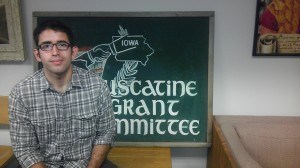I am currently a senior at the University of Iowa and am majoring in history. To get a general idea of the kind of work a historian can do I decided to get a part-time position in the Iowa Women’s Archives (IWA).

The activities that I have been involved in this job so far have consisted of moving boxes of historical records and helping to process material to be put in thearchives. I have worked on two collections. One dealt with the League of Women Voters of Johnson County (LWV-JC). I found it difficult trying to find some kind of order in which to put the material. I benefited from this exercise because I really had no idea what the League of Women Voters was about, but by the end of sorting everything out I was able to get some knowledge on different aspects of the LWV.
The second collection I looked at was of some material donated by Salvador Lopez. It consisted of information on Antonia and Frederico Lopez. I had a better idea of how to work with this collection because it was not as big as the LWV. In working with this collection I learned how to compose a finding aid. While looking through the material I became exposed to the lives of different people who I could relate to. Much of the collection consisted of correspondence between Antonia and Frederico Lopez with their siblings in Mexico. The letters are written in Spanish and being a native Spanish speaker I found this part of the job to be fun because I was able to use my native language and learn the style of writing a letter in Spanish. I have written a few emails to Spanish speaking friends outside of the United States using the beginning style of many of the letters in this collection. There is a certificate of naturalization found in the collection that belonged to Frederico Lopez. This certificate made me wonder how my parents and sibling got their certificate of naturalization. In the collection of Antonia and Frederico getting a certificate is shown as a process that took quite some time. The courses that I have taken at the University of Iowa also helped in understanding some of the material. For example, I was able to see that the Mexican Revolution was a push factor for the Lopez family to leave Mexico and that the jobs offered in Iowa were a pull factor into that state. What I discovered from the letters was that communication by Antonia and Frederico Lopez with family back in Mexico was hard to maintain, which caused some concern from certain individuals in the family. I learned that in several occasions the family in Iowa sent money back to the family in Mexico. Health was also a main concern in many of the letters. Also the discussion of becoming naturalized was presented in one of the letters.
The hardest part of this process was to keep from researching every piece of information. I learned that this collection plays a part with other collections in the Mujeres Latinas Project in the IWA. The League of United Latin American Citizens (LULAC) is also a collection that is located in the IWA. The fact that all these collections are tied together helps me develop a better story about Antonia and Frederico Lopez.
I was told that the finding aid is only supposed to give a glimpse of the material that can be found in the collection and is not meant to be a replacement. I have learned that the finding aid is a tool that is used as reference to the material in a collection and that it can be a very long process for an archivist to do. The organizational skills that I have been learning in this job have really helped me outside of this experience. This job has given me more appreciation for archives and archivists because after working on these two collections I have seen and learned how much work is needed in processing material. Another cool part of this job is the fact that I have been able to access parts of the library which in the past had always been a mystery to me.
–Froilan Orozco, Fall 2011